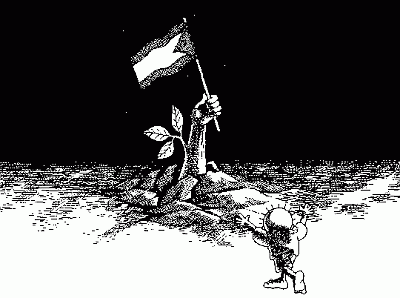One of the biggest contradictions about Lebanon is the symbolism it represents.
For starters, Lebanon represents co-existence and the symbol of peace, where 18 sects co-exist with each other. The Lebanese President even praised the Lebanese model as "a model of coexistence". The other face of Lebanon is the fact it is the next of sectarianism. Sectarian wars that exploded in 1958, 1975 – 1990, 2008, are a proof also that Lebanon is a model for war. I am certain that a lot of Lebanese abroad spend a lot of their time explaining to the world that Lebanon is divided according to sectarian lines, but all Lebanese love each other. Personally, I agree with the former position, sectarianism is imposed from above, and was legitimated since the French mandate. Like all 19th and early 20th century colonial empires, the French mandate imposed a political body that was aimed to divide the communities in order to renew their mandate. The French are gone, but that type of a regime, that suits the traditional family leaders, remained. Few politicians are exceptions to the norm, they bulldozed their way and became integrated into the system. Coexistence also includes the abolishment of sectarianism towards the Palestinian refugees, seek common solutions with them, and the obliteration of racism towards foreign labor (unless they come from the West, then they are treated with royalty).
Lebanon is "Modern and European" but also "Backward". Sure, wherever the Lebanese go, everyone calls Beirut as the "Paris of the East", or dub Lebanon "Switzerland of the East". Of course the difference is, Paris with all its historic glory, is the symbol of academic discussions on racism exploding there: what it means to be a real French. Switzerland is famous for its historic breakthroughs in patching up its communities and enjoy a prosperous peace. Lebanon on the other hand, enjoys a unique night life that is undisputed by any capital in the world. Dubai, Tel Aviv, Istambul, and others tried to recreate that "rich night life" in Lebanon, but so far it didn't reach Beirut's standards. Nevertheless, Beirut, was the city that demolished on daily basis. Theodor Hanf highlights the remarkable phenomenon, during the 1975 – 1990 civil war, how Beirut was rebuilt itself every time there is a seize fire. Nevertheless, it gets demolished again. After the end of the Israeli aggression on Lebanon in 2006, Beirut automatically restored its night life after the Israeli siege of Lebanon was lifted. As a matter of fact, while Israel was bombing Lebanon, nightlife was also booming in Beirut's nightlife. Couple of pub and nightclub managers told me that their profits maxed out to a new level (two in Ras Beirut, two in Gemayzi) during the Israeli aggression. The time when night life plumbed down was during the 2008 mini civil war we experienced, everyone hid in their houses with few peace activists who were trying to build a front for peace. However, nightlife is not a standard measure for modernity. Such a belief makes some people to become backward. Backward is not to have a religious community as well. It is about sectarianism. Backward is not remembering that the politicians need the people, and not as it currently stands, the people need the leaders.
Lebanon is the beacon of "democracy in the Middle East", but Lebanon is ruled by feudal lords. Hence, is it really democratic when the bourgeoisie elites meet up for months and months discussing the layout of the electoral constituencies whereby most of the results are already determined by the borders and alliances? Sure, Lebanon has a democratic competition between two gigantic coalitions, nevertheless, the results of the competitive coalitions appear when only few constituencies determine the real victor. Usually, such constituencies, have the real balance of power. Another side of the coin is how sectarian or political minorities appear to be beaten up by the supporters of the majority. The elections of 2009 showed how even minorities in the same sect are beaten up. Hence, elections in general rotate around how many traditional figureheads will return. The electoral platform of a party or candidate doesn't matter much, it rotates around who is a real Shiite, Christian, Druzi, and Sunni, in the eyes of the voters. Other voters, who are not really that low in number, vote on the premises of choosing between "the lesser evil". In that sense, who will ruin Lebanon's economic statures less than the others. This boils down usually to two coalitions which we already have. Last but not least, Lebanon's "democratic" system is usually hostage for the elites. They spend a lot of time of choosing a government that suits all the tastes of the elites, and that doesn't save the Lebanese from political tensions. As a matter of fact, the stressing-out-of-the-people phenomena contributes in creating sectarian walls.
There is no war but class war
MFL
Subscribe to:
Post Comments (Atom)

2 comments:
I'm sure your Lebanese readers will agree with your assessment.
Lebanon is the beacon of "democracy in the Middle East", but Lebanon is ruled by feudal lords. - an oxymoron if ever i heard one...
I agree with what you said MFL, on the basis that Partying is all what the lebanese are good at. The country is doomed, oh better yet lets use the president term.... THE LEBANESE NATION is doomed, lmao, lebanese nation...ha....we're a freaking farm with lots of cattle running around in circles, guarded by wolves in sheep's clothing.
I say Pack Up and leave people, its time to evacuate this drowning ship, i got my chance and im leaving soon.
MFL face it, people like us don't belong here
And believe it or not, that's my optimistic perspective on the whole thing
Post a Comment